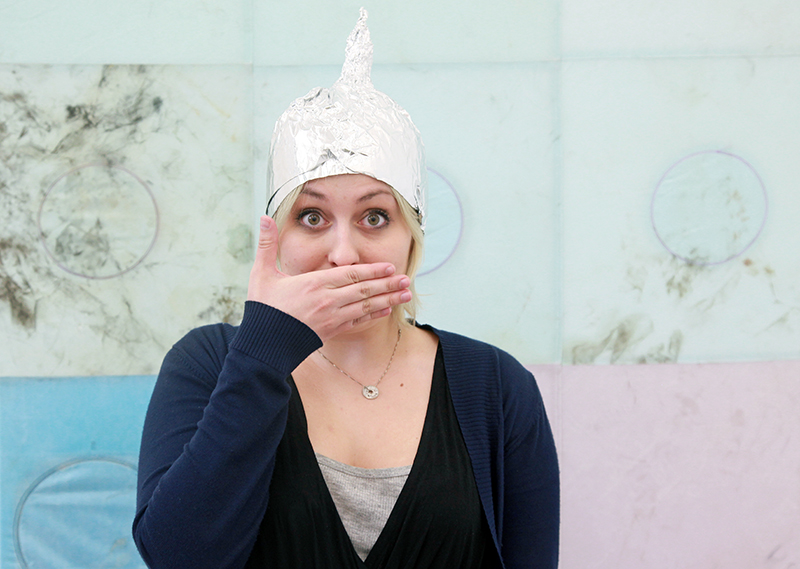You’re Not Crazy: Artists React To Big Brother

“But it was alright, everything was alright, the struggle was finished. He had won the victory over himself. He loved Big Brother.”
The above quote from 1984, George Orwell’s prophetic novel, has been on a lot of people’s minds lately. After revelations brought to the surface by NSA whistleblower Edward Snowden, sales of this classic story went up 7,000% on Amazon. If this is any signifier, it’s apparent that the world is unhappy with the idea that the American government is ruthlessly monitoring all of our online exchanges. Even celebrities, such as rockers Lou Reed and Mick Jagger who have lived for decades under the scrutiny of the public’s eye, have voiced that Obama’s spy campaign is too much.
With such a controversial disclosure of the government overstepping their boundaries, artists naturally have responded. BAPs recently looked into how Berlin's Turkish artists are reacting to the revolution back in their home country, but how are artists across the world defending against the spy in our computer?
Artists: Enemies Of The State
While Germany is universally celebrated as the epicenter of what’s new and exciting in the art world, it was only 80 years ago that it held a very different reputation. In Munich in 1937, the National Socialists held an infamous exhibition showcasing “degenerate” art that went against Nazi idealism. It was an unprecedented example of a government trying to control every aspect of a population’s day-to-day life. While the latest NSA scandal isn’t nearly as horrendous as the actions of the Third Reich, it is eerily reminiscent. While art is not getting censored in most Western nations, artists trying to combat this surge of imperialism.
Stealth Wear – The 'Anti-Drone' Hoodie by Adam Harvey
Recently, a few creatives have developed interesting reactions to executive abuse. Artist Adam Harvey fights against the United States’ use of drones with a line of clothing specifically engineered to fight authoritarian surveillance. Stealth Wear is a fusion between fashion and sophisticated anti-espionage technology that assists the wearer in hiding from drones while preventing remote access to your cellular phone. Another designer by the name of Sang Mun – who once worked for the NSA – has released a typeface that battles against optical character recognition programs:
ZXX Type Specimen Video from Sang Mun.
The characters in its alphabet are decorated with miniature numbers and letters to confuse droids tracking your data. Will artists one day need to write press releases that a robot can’t understand? Will you have to wear a futuristic invisibility cloak to visit a politically charged art exhibition? Hopefully not any time soon, but perhaps these woks would be good investments.
While the government is using the World Wide Web against us, in the past decades artist have also used the Internet as a device to combat the powers that be. One example is the satirical duo the Yes Men (then known as RTmark) who purchased websites associated with political candidates only to expose less-than-generous facts about, for example, George W. Bush. Eva and Franco Mattes, an Italian net.art collective that work under the pseudonym 0100101110101101.org (which is binary code for K.org) have also experimented with “hacktivism.” By exploiting glitches in websites and games, they attempt to reveal inconvenient truths. For instance, in 1998 they acquired the domain name vaticano.org in order to drive traffic to their website criticizing the Catholic Church.
While not self-proclaimed artists, it's in the opinion of the writer that even hacker groups like Lulzsec have intervened in government websites in fairly artistic ways by humorously redesigning enemy homepages, mocking their targets. Furthermore, let’s not forget Ai Wei Wei and Anish Kapoor’s repurpose of Psy’s viral "Gangnam Style" to protest freedom of speech in China. So before you cover your walls with egg cartons, adorn your head with a tinfoil hat, or throw your cell phone in the toilet, you should steal a page from these artists’ playbook and fight back.
Ai Weiwei does Gangnam Style.
It's easy to be cynical about "hacktivist" groups after watching too many episodes of The Big Bang Theory or seeing one too many 13-year-old's wearing Guy Fawkes masks while praising American politicians like Ron Paul. Rather than rolling your eyes at the Internet's protest against the NSA's surveillance, it's important to see that despite these agitating platitudes there is merit in their cry. As the artists described above have shown, it isn't necessary to adopt a credo of digital revolution and hack into the CIA to fight against the powers that be. But by simply showing the world that you are willing to react and are able to use the same tools of oppression against the government, you are able to put fear in the heart of those that tyrannize – and not the other way around.
Article by James Shaeffer
Be the first to write a comment.
Your feedback
